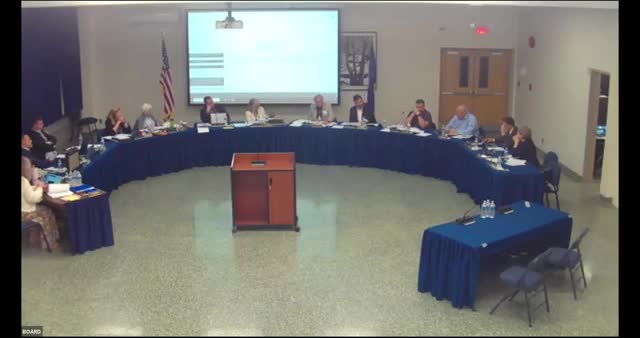School Board debates personal device policies and language on substance abuse
June 19, 2025 | NORTHPORT-EAST NORTHPORT UNION FREE SCHOOL DISTRIC, School Districts, New York
This article was created by AI summarizing key points discussed. AI makes mistakes, so for full details and context, please refer to the video of the full meeting. Please report any errors so we can fix them. Report an error »

In a recent meeting of the Northport-East Northport Union Free School District Board of Education, significant discussions centered around student physical education requirements and the use of personal electronic devices in schools. These topics reflect ongoing concerns about student well-being and the educational environment.
One of the primary issues raised was the stress associated with the district's physical education grading policy. A parent expressed concern that the current system places undue pressure on students, particularly those who may not excel in traditional athletic activities. The discussion highlighted the need for a more inclusive approach to physical education that recognizes diverse student strengths and interests. The board acknowledged the importance of revisiting the policy to ensure it supports all students, regardless of their athletic abilities.
Another major topic was the district's policy on personal electronic devices. Board members discussed the challenges posed by new regulations that restrict student use of personal devices during school hours. While some educators see the potential benefits of allowing personal devices for educational purposes, concerns were raised about the enforcement of these policies and the distractions they may cause. The board noted that while the law mandates certain restrictions, there is a need for flexibility to accommodate students' educational needs, such as accessing information for research.
Additionally, a proposal to update the language in the district's drug and alcohol policy was discussed. A board member suggested replacing the term "drug abuse" with "drug misuse" to reduce stigma and promote a more supportive approach to students and staff facing substance-related issues. This change aims to foster a culture of understanding and rehabilitation rather than punishment.
As the board continues to navigate these complex issues, the discussions reflect a commitment to creating a supportive and effective educational environment for all students. The outcomes of these deliberations will play a crucial role in shaping policies that directly impact the community's youth and their educational experiences.
One of the primary issues raised was the stress associated with the district's physical education grading policy. A parent expressed concern that the current system places undue pressure on students, particularly those who may not excel in traditional athletic activities. The discussion highlighted the need for a more inclusive approach to physical education that recognizes diverse student strengths and interests. The board acknowledged the importance of revisiting the policy to ensure it supports all students, regardless of their athletic abilities.
Another major topic was the district's policy on personal electronic devices. Board members discussed the challenges posed by new regulations that restrict student use of personal devices during school hours. While some educators see the potential benefits of allowing personal devices for educational purposes, concerns were raised about the enforcement of these policies and the distractions they may cause. The board noted that while the law mandates certain restrictions, there is a need for flexibility to accommodate students' educational needs, such as accessing information for research.
Additionally, a proposal to update the language in the district's drug and alcohol policy was discussed. A board member suggested replacing the term "drug abuse" with "drug misuse" to reduce stigma and promote a more supportive approach to students and staff facing substance-related issues. This change aims to foster a culture of understanding and rehabilitation rather than punishment.
As the board continues to navigate these complex issues, the discussions reflect a commitment to creating a supportive and effective educational environment for all students. The outcomes of these deliberations will play a crucial role in shaping policies that directly impact the community's youth and their educational experiences.
View full meeting
This article is based on a recent meeting—watch the full video and explore the complete transcript for deeper insights into the discussion.
View full meeting
